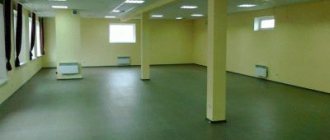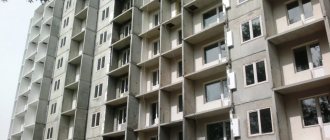Legislative regulation
The purpose of a residential premises and the limits of its use are regulated by a mass of regulatory documents, and familiarization with them will help to avoid serious mistakes.
- The Housing Code is the basic law in the field of housing law, lists the basic rights and obligations of both the owner and the user of residential premises, and contains many other provisions.
- Civil Code - defines the general rules for the use by citizens of their rights, housing, in particular, it gives the definition of residential premises and the basic criteria for its use.
- Code of Administrative Offenses – the basis and limits for bringing liability, options for punishment for violations, in particular, the use of residential premises for other purposes.
- By-laws of a technical nature, for example, rules for the use of residential premises, its maintenance and repair.
- Sanitary and other hygienic standards determine the degree of danger of a particular activity.
Partially, the influence comes from judicial practice: the positions of the RF Armed Forces in the resolutions of the Plenums and Reviews of Practice.
The Constitutional Court will decide whether religious services in a residential building are an inappropriate use of land
On October 8, the Constitutional Court will consider the complaint of Olga Glamozdinova (available from “AG”), which challenges the constitutionality of paragraph. 2 tbsp. 42 of the Land Code and Part 1 of Art. 8.8 Code of Administrative Offences. According to the applicant, they contain legal uncertainty that makes it possible to hold the owners of plots and residential premises located on them administratively liable for misuse of land when providing these premises to religious organizations for worship.
The interests of the applicant are represented by Vladimir Ryakhovsky, a member of the Council under the President of the Russian Federation for the Development of Civil Society and Human Rights, managing partner of the Slavic Legal Center, and Sergei Chugunov, a lawyer at the Slavic Legal Center.
Punishment for worshiping in the home
Olga Glamozdinova owns a plot of land in the village of Vesely, Veselovsky district, Rostov region, which belongs to the lands of populated areas. In accordance with the type of permitted use, the plot is intended for personal farming. There is a residential building on it, also owned by a woman.
Olga Glamozdinova is a parishioner of the local religious organization of the Seventh Day Adventist Church. As stated in the complaint, this organization does not have real estate, so the woman allowed the address of her residential building to be used to enter it into the Unified State Register of Legal Entities as the address at which communication with the legal entity is carried out. The applicant’s representative emphasized that clause 5 of Art. 11 of the Law on Freedom of Conscience and Religious Associations does not prohibit registering religious organizations in this way.
The complaint notes that Olga Glamozdinova also provided the church with one living room in her house free of charge for four hours a week for worship. The rights of third parties, according to lawyers, are not violated.
On September 6, 2021, by a resolution of the chief state inspector of the Veselovsky district for the use and protection of land, a woman was brought to administrative responsibility for using her land plot for other than its intended purpose in accordance with its belonging to one or another category of land and permitted use (Part 1 of Art. 8.8 Code of Administrative Offenses of the Russian Federation). She was sentenced to a fine of 10 thousand rubles.
Olga Glamozdinova appealed the non-normative act, but the Bagaevsky District Court of the Rostov Region on October 16, 2021 refused to satisfy her demands. He, as stated in the complaint, agreed with the official’s conclusions and established that the woman, being the owner of a land plot provided from the lands of settlements for the placement of an individual household, “used it not in accordance with the permitted use, but for conducting religious services, rituals and ceremonies."
On November 21, 2021, the Rostov Regional Court upheld the decision of the first instance. Olga Glamozdinova tried to appeal the decision of the official and the acts of lower courts through the cassation procedure. However, on April 28, 2021, by a resolution of the Deputy Chairman of the Rostov Regional Court, these acts were left unchanged.
Arguments of the complaint to the Constitutional Court
The complaint to the Constitutional Court notes that Art. 42 of the Land Code establishes that owners of land plots are obliged to use them in accordance with their intended purpose. The applicant believes that the norm is not formulated clearly enough, which allows law enforcers to extend this obligation of the owner to also cover how and for what purpose the real estate located on a given land plot can be used.
Such an interpretation and application of the law, as stated in the complaint, leads to the fact that land owners are brought to administrative liability on the basis of Part 1 of Art. 8.8 of the Code of Administrative Offenses for using a land plot not for its intended purpose, while the regulatory authorities do not agree with how the building located on this land plot, and not the plot itself, is used.
It is emphasized that the contested norms do not comply with the Constitution and the Convention for the Protection of Human Rights and Fundamental Freedoms, since they do not comply with the general conditions for the admissibility of restrictions on the law, according to which a restriction is possible only if it is provided for by law.
Olga Glamozdinova believes that holding her accountable for providing the address of her house for registration of a religious organization, as well as providing this organization with a room in the house for holding services, violates her right to freedom of conscience and religion, as well as the right to private property.
According to the applicant, the Land Code as a whole and the appealed paragraph. 2 hours 1 tbsp. 42, in particular, establish the legal regime of lands in settlements based on their belonging to a certain category and permitted use, which excludes the possibility of using the land plot and real estate firmly associated with it for another purpose.
The applicant referred to the Determination of the Constitutional Court of September 27, 2021 No. 2347-O, which states that the Constitution enshrines as the basic principle of land legislation the principle of dividing land into categories according to its intended purpose. This principle of land legislation, as indicated by the Constitutional Court, is designed to ensure the effective use and at the same time protection of land as an important component of the environment.
Moreover, as stated in the complaint, the Court had previously assessed the extension of the principle of the intended use of a site to residential premises. Thus, in Resolution No. 7-P of April 14, 2008, he noted that neither civil nor housing legislation excludes the possibility of using residential buildings located on garden plots for purposes other than recreation, including for permanent or preferential residence. In the same act, the Constitutional Court indicated that the inconsistency of civil, land and town planning legislation gives rise to legal uncertainty and makes it possible to refuse registration at the place of residence to citizens who permanently reside in residential buildings erected on garden land plots that legally belong to them and are suitable for permanent residence and being their only possible place of residence.
The lawyers drew the Court's attention to the fact that in the applicant's case there was also a discrepancy in legal norms. Thus, land legislation establishes the principle of dividing lands into categories according to their intended purpose, according to which the legal regime of lands is determined based on their belonging to a certain category and permitted use. In turn, Part 1 of Art. 8.8 of the Code of Administrative Offenses of the Russian Federation provides for liability for the use of a land plot other than for its intended purpose.
Moreover, in Part 2 of Art. 16 of the Law on Freedom of Conscience and Religious Associations states that worship services and other religious rites and ceremonies can be freely performed, including in residential premises. However, the Rostov Regional Court, in a decision dated November 21, 2017 in the case of Olga Glamozdinova, noted that the reference to this norm does not affect the qualifications, since the objective side of the offense provided for in Part 1 of Art. 8.8 of the Code of Administrative Offenses of the Russian Federation constitutes the use of a land plot not for its intended purpose, which implies the implementation of land use not in accordance with the legal regime determined by the competent authority.
The complaint also states that the existing legal uncertainty gives rise to contradictory judicial practice in different regions. In support, decisions of the courts of the Rostov, Moscow and Sverdlovsk regions, as well as the Republic of Mari El, were cited, where, under similar circumstances, in some cases the owner of a residential premises was brought to administrative responsibility, and in others the proceedings were terminated.
Taking into account the above, the applicant demanded that it be declared contrary to Art. 28, part 2 art. 35 and part 3 of Art. 55 of the Constitution provisions para. 2 tbsp. 42 of the Land Code and Part 1 of Art. 8.8 of the Code of Administrative Offenses as containing legal uncertainty, which makes it possible to bring to administrative responsibility for the misuse of a land plot the owners of plots and residential premises located on them, when providing these premises to religious organizations for worship, other religious rites and ceremonies.
Position of the HRC
On October 3, the Council under the President of the Russian Federation for the Development of Civil Society and Human Rights sent to the Constitutional Court an expert opinion of the HRC Standing Commission on Scientific and Legal Expertise and the Development of Alternative Methods of Conflict Resolution on the complaint of Olga Glamozdinova.
The Council considered bringing a woman to administrative responsibility as a violation of her rights guaranteed by Art. 28 of the Constitution. In his opinion, such an interpretation of paragraph. 2 tbsp. 42 of the Land Code in isolation from the provisions of Art. 28 of the Constitution of the Russian Federation and Art. 16 of the Law on Freedom of Conscience and Religious Associations is erroneous.
In support of its position, the commission, like the applicant, referred to the Constitutional Court Resolution No. 7-P of April 14, 2008. She also confirmed that the actions of Olga Glamozdinova do not fall under the restrictive provisions of Part 2 of Art. 9 of the Convention for the Protection of Human Rights and Fundamental Freedoms and Art. 1 of Protocol No. 1 to this convention, since they do not pose a threat to public order, health, morals or to the protection of the rights and freedoms of others.
The HRC also recalled that Art. 8.8 of the Code of Administrative Offenses provides for liability for violation of legislation in the field of environmental protection and natural resource management, which was not committed in this case. According to the commission, the erroneous application of this norm is due to the legal uncertainty of Art. 42 of the Land Code and Art. 8.8 Code of Administrative Offenses of the Russian Federation.
The Council drew attention to the fact that neither the control body nor the court refuted the fact of the presence on the land plot of a house built in accordance with the law and owned by Olga Glamozdinova. The commission believes that “issues of the functional use of a home ownership relate exclusively to the use of this property, but not the land plot.”
As stated in the document, the established type of permitted use “for running a personal subsidiary plot” does not limit the owner’s right to use the house or part of it located on the site to exercise the right guaranteed by the Constitution to profess any religion, including holding joint worship with fellow believers. “The fact of using Glamozdinova O.V. own residential building for joint worship in no way means the use of a land plot for purposes other than those established for the category of land in populated areas,” the commission considered.
According to the HRC, the Constitutional Court could, during the consideration of the complaint, reveal the constitutional and legal meaning of the contested norm of the Land Code. According to the Council, this provision of land legislation does not prevent the use of legally constructed residential buildings in accordance with the will and interests of their owners, including for religious ceremonies and services. Prosecution under Art. 8.8 of the Administrative Code in this case, as the commission indicated, is unacceptable.
The Council noted that, as it seems to it, the constitutional and legal meaning of Art. 8.8 of the Code of Administrative Offenses is to establish liability specifically for the misuse of a land plot, taking into account the restrictive conditions established by the Land Code, which cannot be violated by holding services and religious ceremonies in a residential building located on the site.
“Identification of the constitutional and legal meaning of the provisions of paragraph. 2 tbsp. 42 of the Land Code of the Russian Federation and Part 1 of Art. 8.8 of the Code of Administrative Offenses of the Russian Federation should exclude the possibility of using these norms in order to limit the constitutional right enshrined in Art. 28 of the Constitution of the Russian Federation, since the contested restriction of this right is not directly provided for by law, and the interpretation in law enforcement practice of such a restriction as possible and proportionate is - in accordance with the criteria of Part 3 of Art. 55 of the Constitution of the Russian Federation is unacceptable,” the commission concluded.
Representative's comment
Sergei Chugunov told AG that at the moment the issue of bringing citizens or religious organizations to administrative responsibility for the misuse of land plots under residential buildings when holding religious services in them is quite relevant.
“Similar decisions are made in many regions - from the Moscow region to the Primorsky Territory. Moreover, this practice has spread not only to residential premises, but also to other buildings and premises in which religious organizations hold their services. Not all religious organizations in the building have religious status according to documents. Usually, religious services are held in former cultural centers or other administrative buildings, which is regarded by regulatory authorities as using the land for other purposes,” the lawyer explained.
This situation, according to him, is possible due to the fact that the provisions of the law are not formulated clearly enough. “This allows law enforcers to extend the owner’s responsibility for the intended use of a land plot to also cover how and for what purpose the real estate located on a given land plot can be used. I believe that such an interpretation and application of the law is unacceptable, as it leads to an unreasonable restriction of the constitutional rights of citizens,” said Sergei Chugunov.
Features of the use of residential premises
Premises are divided into residential and non-residential, the first are allocated for living, the second for economic or other needs of the house. A dwelling is an isolated space for the personal use of one person or members of his family or those whom he allows to move in.
The right to housing is a basic human right and is closely related to other rights, in particular the right to privacy.
Art. 17 of the Housing Code of the Russian Federation gives the right to limited use of housing in business activities. The limitations are expressed in two points:
- residents must give consent to engage in entrepreneurial and other activities;
- the person occupies the premises legally;
- standards of sanitation, hygiene and the rights of other neighboring residents are not violated.
The concept of residential premises, its intended purpose. Types of residential premises.
A residential premises is recognized as an isolated premises, which is real estate and is suitable for permanent residence of citizens (meets established sanitary and technical rules and standards, other legal requirements (Part 2 of Article 15 of the RF Housing Code), for example, fire safety, urban planning and technical.
Residential premises include:
1) residential building, part of a residential building;
2) apartment, part of an apartment;
3) room.
A residential building is recognized as an individually defined building, which consists of rooms, as well as premises for auxiliary use, intended to satisfy citizens' household and other needs related to their residence in such a building.
An apartment building as a specific complex object consists of: a) residential premises; b) from non-residential premises; c) from premises intended for servicing residential and non-residential premises and access to them (auxiliary premises), closely related to them by purpose and following the legal fate of residential and non-residential premises.
An apartment is recognized as a structurally separate room in an apartment building, providing direct access to the common areas in such a house and consisting of one or more rooms, as well as auxiliary premises intended to satisfy citizens' household and other needs related to their residence in such a separate apartment. indoors
A room is recognized as a part of a residential building or apartment intended for use as a place of direct residence of citizens in a residential building or apartment. A room is a part of an apartment separated by permanent walls * (59). According to their purpose, rooms are divided into residential (bedrooms, living rooms, etc.) and auxiliary (corridors, kitchen, bathroom, toilet, storage rooms).
Of great practical importance is the allocation indoors of: 1) usable (total) area, i.e. the area of all living rooms of the apartment and the auxiliary (utility) premises available in it (corridors, kitchen, bathroom, storage rooms, etc.), and 2) living area, which includes only the area of living rooms, including the area of bedrooms and dining rooms rooms, rooms for games, study and relaxation, as well as the area of insulated verandas equipped for living *(61).
The total area of a residential premises consists of the sum of the areas of all parts of such premises, including the area of auxiliary premises intended to satisfy citizens' household and other needs related to their residence in residential premises, with the exception of balconies, loggias, verandas and terraces (Part 5 of Art. 15 Housing Code of the Russian Federation). The total area includes the area of all living rooms of the apartment and the auxiliary (utility) premises available in it (corridors, kitchen, bathroom, storage rooms, etc.).
Residential premises (buildings) are also divided into the following groups: - apartment-type premises (buildings). In such residential premises, the entire or predominant part of the area is occupied by apartments; — dormitory-type buildings; - dacha-type buildings, adapted for permanent, year-round living (summer dachas do not apply to them) * (62); — barracks-type premises to accommodate certain categories of military personnel. The requirements for them and the procedure for using them are determined by the Charter of the Internal Service of the Armed Forces of the Russian Federation and departmental regulatory legal acts.
Prohibition of production activities
The law prohibits engaging in production activities in an apartment or house. A specific definition of what this is is not given in any legislative act. The criterion is based not on an assessment of what the owner or tenant is doing, but on the extent to which his actions affect the rights and freedoms of other citizens. For example, in the apartment no one is engaged in any kind of production, but often allows themselves to shout or make noise. Noise is considered a violation of the rights of other residents, but does not exceed the scope of use of the premises.
Thus, using a residential premises for other purposes and violating the rights of other residents are not always the same thing.
Responsibility for misuse of non-residential premises.
Objects not intended for human habitation may also have a purpose according to their purpose of use. As a result, owners or users of these premises must also comply with established standards.
For example, areas designated for warehousing or retail trade cannot be used to organize public catering outlets (bars, restaurants, etc.)
If the rules for the use of non-residential premises are not followed, the perpetrator may be punished as follows:
- If sanitation requirements are violated, then prosecution is carried out under Article of the Code of Administrative Offenses No. 6. 3, 4.
- Early termination of the lease agreement if there is a violation of its terms by the tenant. What is stipulated by the articles of the Civil Code.
- Compensation for damage to property, as well as moral damage to individuals and legal entities.
What types of business activities are allowed?
A striking example is the activity of lawyers, who are allowed to set up their offices in residential premises. They receive citizens, advise them, and draw up documents. Their activities have an intellectual form.
The same can be said about accountants, computer program developers and other specialists.
If we talk about manual labor specialists: seamstresses, jewelers, they are also not prohibited from working in residential premises.
In fact, we are talking about whether the infrastructure of the house will suffer from the activities of the entrepreneur, for example, the creation of excessive voltage in the electrical network, excessive load on the drainage system.
Some activities may pose a danger to others. For example, a rehabilitation doctor may well provide some services at home, but a virologist is unlikely to do so. The materials he works with are highly hazardous. We must not forget that a residential building is a building built and equipped for special purposes; it cannot be called universal.
So whether an entrepreneur has the right to use the premises as an office is determined by specific circumstances, and not by the types of his activities.
Rules for the use of residential premises
By government decision (Decree No. 25 of January 21, 2006), rules for the use of residential premises were adopted. This document applies to owners and users. He reveals the contents of Art. in more detail. 17 Housing Code of the Russian Federation.
It does not matter on what basis the housing was received (acquired by ownership or from the state or from an enterprise or employing organization). The set of rights and responsibilities is standard.
Their approximate list:
- the right of residence belongs to the owner and tenant and their family members and other persons whom they allowed to move in;
- the entry of other persons is permitted with the permission of other residents, with the exception of children who have not yet turned 18 years of age;
- Renting out premises is permitted with the consent of other residents and the owner;
- the tenant’s responsibilities include carrying out routine repairs, unless otherwise provided by agreement with the owner;
- the employer is obliged to pay utilities and other services on time;
- the resident is obliged to take care of the common property of the owners of the house, take measures to preserve it, and inform the owner about their need;
- redevelopment and reconstruction of residential premises is carried out exclusively in the manner prescribed by law.
The use of residential premises also implies rights. For example, a tenant has the right to demand proper living conditions. Often, authorities offer citizens in need of housing premises that are clearly not suitable for this. They either do not have normal heating, there is no drainage, and the minimum compliance with sanitary standards is not ensured.
Considering the fact that there is a whole mass of regulatory documents, the rules for the use of residential premises are indicative.
Commentary on Article 17 of the RF Housing Code
1. The commented article (as well as other provisions of the Housing Code of the Russian Federation, as well as the Civil Code of the Russian Federation) clearly determines that residential premises must be used in accordance with their purpose. Yes, Art. 67 of the RF Housing Code obliges the tenant to use the residential premises for their intended purpose and within established limits; Art. 678 of the Civil Code of the Russian Federation establishes that the tenant is obliged to use residential premises only for living; Art. 30 of the Housing Code of the Russian Federation requires that the owner use the housing he owns for its intended purpose; according to Art. 288 of the Civil Code of the Russian Federation, residential premises are intended for the residence of citizens.
The tenant of a residential premises can transfer it to a citizen under a sublease agreement (Article 76 of the Housing Code of the Russian Federation, Article 685 of the Civil Code of the Russian Federation), the owner - under a lease agreement (Article 30 of the Housing Code of the Russian Federation, Chapter 35 of the Civil Code of the Russian Federation). But at the same time the requirements of Art. 17 of the Housing Code of the Russian Federation - the use of housing for citizens.
If the residential premises are not used for their intended purpose, this entails termination of the rental agreement and eviction (Articles 83 and 91 of the Housing Code of the Russian Federation; Articles 687 and 688 of the Civil Code of the Russian Federation). According to Art. 293 of the Civil Code of the Russian Federation, the use by the owner of his home for other purposes may lead to its forced seizure.
2. It is unacceptable to place industrial production in residential premises. Article 288 of the Civil Code of the Russian Federation provides: the placement by the owner of enterprises, institutions, and organizations in residential premises belonging to him is allowed only after the transfer of such premises to non-residential premises.
The Plenum of the Supreme Court of the Russian Federation and the Plenum of the Supreme Arbitration Court of the Russian Federation decided that transactions related to rent (hire of property), gratuitous use, as well as other, not related to the residence of citizens, use by organizations of residential premises that were not transferred to non-residential premises are void on the grounds provided for in Art. 168 of the Civil Code of the Russian Federation, as transactions that do not comply with the requirements of the law (Resolution of the Plenums of the Supreme Court of the Russian Federation and the Supreme Arbitration Court of the Russian Federation No. 6/8).
3. The requirement to respect the rights and legitimate interests of citizens living in residential premises, as well as neighbors, is contained, in particular, in Art. 29 (part 4), art. 30 (part 4) of the RF Housing Code (Article 40 also deserves attention in this regard, see commentary to it).
Articles 83 and 91 of the Housing Code of the Russian Federation (Articles 687 and 688 of the Civil Code of the Russian Federation) provide for the termination of rental contracts and the eviction of citizens who systematically violate the rights and interests of neighbors.
Article 79 of the RF Housing Code provides for the termination of a residential sublease agreement (subject to certain conditions and procedures) if citizens living under the terms of such an agreement violate the rights and interests of their neighbors. It is noteworthy that in order to sublease residential premises located in a communal apartment, the consent of all persons occupying other residential premises as tenants or owners, as well as members of their families is required (Article 76 of the Housing Code of the Russian Federation).
According to Art. 209 of the Civil Code of the Russian Federation, the owner has the right, at his own discretion, to take any actions in relation to his property that do not contradict the law and other legal acts and do not violate the rights and interests protected by law of other persons. The requirement to respect the rights and legitimate interests of other persons is based on the norm of Part 3 of Art. 17 of the Constitution of the Russian Federation.
4. Fire safety requirements are determined by Order of the Ministry of Emergency Situations of Russia dated June 18, 2003 N 313 “On approval of Fire Safety Rules in the Russian Federation (PPB01-03)” <1>, adopted in accordance with Federal Law dated December 21, 2003 N 69-FZ “On fire safety". Sanitary and epidemiological requirements for residential buildings and premises were approved by the Ministry of Health of Russia on December 15, 2000 (SanPiN 2.1.2.1002-00).
——————————— <1> RG. N 129. 2003.
5. The Government of the Russian Federation adopted Resolution No. 25 <1> dated January 21, 2006, which approved the Rules for the use of residential premises. They establish the rights and obligations of the parties to a housing tenancy agreement. Thus, the tenant of a residential premises is obliged to ensure its safety, treat the residential building, residential premises, sanitary-technical and other equipment with care, comply with the rules for the use of housing, fire safety rules, keep the residential premises clean and tidy, common areas of the house, promptly carry out repair of residential premises, not to allow actions that lead to damage to the premises or violate the normal living conditions of citizens.
——————————— <1> NW RF. 2006. N 5. Art. 546.
6. Part 2 of the commented article allows the use of housing - along with accommodation - for individual entrepreneurial activity. Quite large groups of citizens are engaged in professional activities at home: scientists, writers, programmers, etc. The criteria for the limits of such activities are: respect for the rights and interests of neighbors; fulfillment of requirements for the use of utility networks and equipment in accordance with the technical parameters of the building, the level of noise, radiation, etc.
Maintenance and repair
Regularly, co-owners of apartment buildings receive receipts that contain the line “maintenance and repair of residential premises.” Unknowing people are surprised to find out what it is.
The rules for the use of residential premises mostly apply to property for which one owner is responsible. The legislation provides for rules for the maintenance and repair of common property (RF Decree No. 413 dated August 13, 2006).
The document provides a long list of common property that is considered common. As a rule, these are equipment and premises that are used to service more than one apartment. This includes various utility networks.
The rules prescribe a minimum list of measures for cleaning and maintaining this property in order. Management organizations are not entitled to provide services less than this minimum.
The rules provide for periodic construction and technical examinations in order to assess the condition of a residential building.
Money for repairs and maintenance of a residential building is taken primarily from contributions from citizens who are required to pay for services monthly. Citizens entitled to benefits receive subsidies, paying only partly for services out of their own pockets.
Funds for capital repairs are also taken from the funds of the owners and the capital construction fund. Initiative owners have the right to choose to accumulate funds outside the framework of the fund in a special account. The money collected from it is intended for the renovation of one house.
It will not be possible to isolate yourself from the obligation to pay expenses for common property. The reason is that, having purchased an apartment, the owner also acquires a share in the common property.
A similar obligation is acquired by the owner of non-residential premises in an apartment building. Thus, the maintenance and repair of residential premises is both a general and personal responsibility.
Administrative fines
According to the Code of Administrative Offences, the following are punishable:
- for violation of the rules for the use of residential premises;
- for violation of maintenance and repair rules;
- unauthorized connection to water supply and sewerage systems;
- unauthorized connection to electrical and heating networks.
Violations are listed in Art. Art. 7.19–7.22 Code of Administrative Offences.
The first article includes actions to damage residential premises, their equipment, illegal redevelopment and re-equipment and use of residential premises for other purposes. Responsibility is insignificant.
The article for violations of the rules for maintaining and repairing premises, the procedure for recognizing the impossibility of living in them, illegal transfer of premises to non-residential, is intended for officials and organizations.
The amount of fines depends on who they are assigned to. Citizens are required to pay no more than 4 thousand rubles, officials and organizations pay from 4 to 50 thousand rubles.
The fines are reviewed periodically so that the values described will change over time.
Property liability
Administrative fines are a measure of liability to the state; they do not exempt from payment of compensation for property and moral damage. Material losses are paid in full.
In addition, a citizen who has been brought to administrative responsibility for violations of housing legislation at least three times may lose his or her housing.
The law specifies repeated violations; in practice, 3 times a year are usually sufficient. The severity of the violations and other circumstances are taken into account.
If he received it from the state, then the contract for the right to use with him is terminated through the court, and he is evicted without the right to receive other housing.
If housing is privatized, then the law assumes the right of the state to buy it and evict the citizen. The presence of debts or other obligations, if there is only one piece of real estate for living, deprives the state of the opportunity to sell it and transfer the rest of the money to the former owner. There is a contradiction in the legislation, and it has not yet been eliminated.






